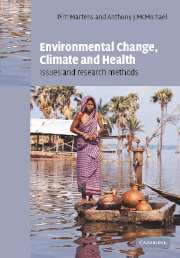Book contents
- Frontmatter
- Contents
- List of contributors
- Foreword
- 1 Global environmental changes: anticipating and assessing risks to health
- 2 Historical connections between climate, medical thought and human health
- 3 The contribution of global environmental factors to ill-health
- 4 Surprise, nonlinearity and complex behaviour
- 5 Epidemiological and impacts assessment methods
- 6 Retrospective studies: analogue approaches to describing climate variability and health
- 7 Detecting the infectious disease consequences of climate change and extreme weather events
- 8 Integrated Assessment modelling of human health impacts
- 9 Remote sensing, GIS and spatial statistics: powerful tools for landscape epidemiology
- 10 Monitoring the health impacts of global climate change
- 11 Epidemiology, environmental health and global change
- 12 Dealing with scientific uncertainties
- Index
- Plate section
Foreword
Published online by Cambridge University Press: 28 July 2009
- Frontmatter
- Contents
- List of contributors
- Foreword
- 1 Global environmental changes: anticipating and assessing risks to health
- 2 Historical connections between climate, medical thought and human health
- 3 The contribution of global environmental factors to ill-health
- 4 Surprise, nonlinearity and complex behaviour
- 5 Epidemiological and impacts assessment methods
- 6 Retrospective studies: analogue approaches to describing climate variability and health
- 7 Detecting the infectious disease consequences of climate change and extreme weather events
- 8 Integrated Assessment modelling of human health impacts
- 9 Remote sensing, GIS and spatial statistics: powerful tools for landscape epidemiology
- 10 Monitoring the health impacts of global climate change
- 11 Epidemiology, environmental health and global change
- 12 Dealing with scientific uncertainties
- Index
- Plate section
Summary
Over the past two decades there has been a rapid evolution of research concepts and methods in relation to global environmental changes – their processes, impacts and the response options. The scale and complexity of these environmental problems are, in general, greater than those that individual scientists or their disciplines usually address. This is particularly so for those components of the topic that are furthest “downstream” from the pressures, or their drivers, that initiate the processes of global environmental change.
Indeed, in seeking to detect or forecast the population health impacts of global environmental changes there is an additional difficulty. Not only is the impact of research contingent on various assumptions, simplifications and projections made by scientists working “upstream” on the environmental change process per se, but the category of outcome – a change in the rate of disease or death – is one that usually has multiple contending explanations. If a glacier melts, then temperature increase is a very plausible explanation. Likewise, if birds, bees and buds exhibit their springtime behaviours a little earlier as background temperatures rise, that too is reasonably attributable to climatic change. However, if malaria ascends in the highlands of eastern Africa, regional climate change is just one contending explanation – along with changes in patterns of land use, population movement, increased urban poverty, a decline in the use of pesticides for mosquito control, or the rise of resistance to antimalarial drugs by the parasite.
- Type
- Chapter
- Information
- Environmental Change, Climate and HealthIssues and Research Methods, pp. xi - xivPublisher: Cambridge University PressPrint publication year: 2002



